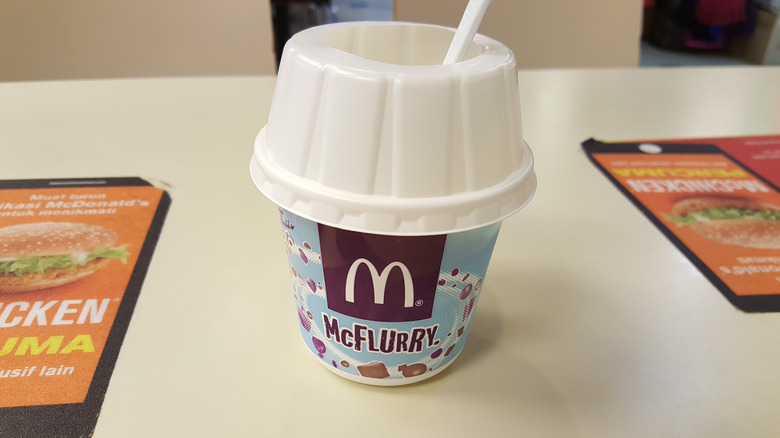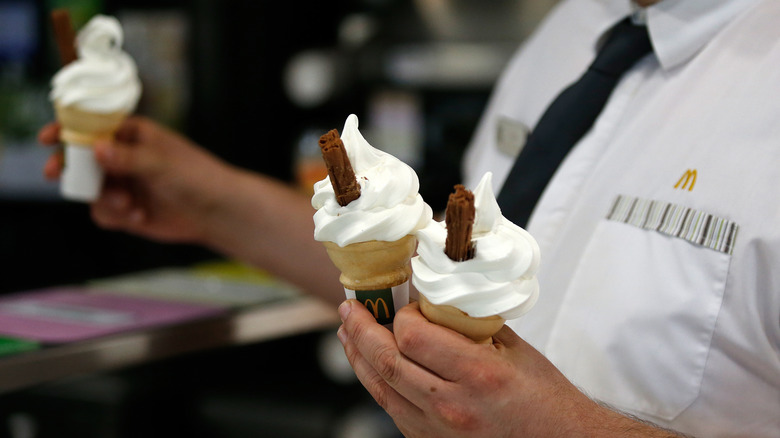What Newly Revealed Emails Mean For McDonald's Ice Cream Machine Lawsuit
While the frequent inability to order McDonald's creamy and elusive soft serve has long been a shared struggle of ice cream fans everywhere, the fast food juggernaut may be facing more than just customer backlash over its failing ice cream machines. It now finds itself in the center of a soft serve-fueled legal battle.
According to WIRED, the problems related to the under-functioning machines began last May. That's when the tech startup Kytch — which developed a device that helps McDonald's franchisees troubleshoot issues with the finicky soft serve machines — sued Taylor, the company that makes the devices in question. Kytch's lawsuit accused Taylor of creating a copycat of their machine monitoring device in an effort to put them out of business. Now, new court documents have indicated that not only did Taylor deliberately set out to mimic the competing company's technology, but it was working at the behest of McDonald's itself.
While many jaded McDonald's customers have long theorized that the "broken" machines were actually workers unwilling to operate the soft serve dispensers, it may not be so easy. According to the Wall Street Journal, many franchise owners report that the machines break often, are complicated to fix, and require specialist technicians to repair.
The Feds investigated the failing machines
The Federal Trade Commission was so alarmed by the frequency of broken machines that the agency took it upon itself to investigate the malfunctioning devices. This investigation was in part prompted by the Kytch lawsuit, which accused Taylor of blocking the basic rights of franchise owners to repair their own equipment.
After the release of the Kytch device — designed to intercept data from the Taylor ice cream machines — in 2019, McDonald's swiftly acted to block the use of the tool (via WIRED). Corporate sent a memo to franchisees in fall 2020, urging them to immediately cease using Kytch's product, citing that it was accessing "proprietary data." Instead, McDonald's recommended Taylor's own new Shake Sundae Connectivity device. Conveniently enough, it could only be used with upgraded machines.
In the lawsuit, Kytch accused Taylor of deliberately ripping off their technology for their own, less effective Shake Sundae Connectivity. Kytch co-founder Melissa Nelson claimed that "there was a concerted effort to not only obtain and copy our device and follow everything we were doing, but then also, when it hit a critical mass, to actually put us out of business."
The legal battle over McDonald's soft serve is heating up
Now, Taylor company emails subpoenaed for the court case have shown that not only did the ice cream machine maker deliberately copy Kytch but that McDonald's may have played a larger hand in the scheme than previously thought (via Wall Street Journal).
In one 2019 email, current Taylor COO Jim Minard (then VP of engineering) directed a staff member to "buy a [Kytch] kit and provide me a written evaluation on the hardware and software." Minard says that Taylor had already been working on a troubleshooting machine for years. However, other emails indicate that Taylor higher-ups were working to imitate Kych's interface. A 2020 email from Taylor president Jeremy Dobrowolski indicated that "McDonald's is all hot and heavy" about Kytch's growing presence at their franchises.
A McDonald's spokesperson maintains that the chain is all about "food quality and safety, which is why all equipment in the McDonald's restaurants is thoroughly vetted before it's approved for use," adding that there was no attempt "to copy or steal Kytch's technology" (via WIRED). Yet, it's unlikely that the legal drama over the temperamental machines will be resolved any time soon, though the emails don't necessarily help the fast food giant's case. Unfortunately for the average McDonald's customer, that probably means more "broken" ice cream machines.


